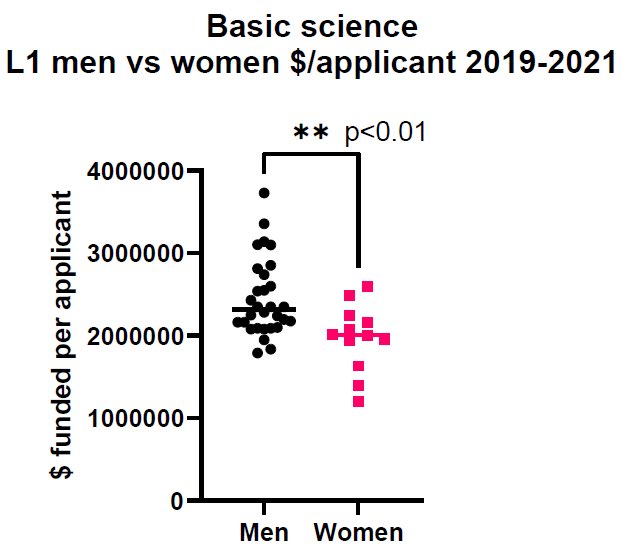Analysis of the results of the 1st three yrs of NHMRC Investigator Grants has revealed that gender equity is not being addressed adequately. Analysis of the $ funded per person has revealed L1 basic women received ~ $500K less than men. These are lab heads 10-15 yrs post-PhD. 1/5 

Yesterday I asked Twitter researchers what it would mean for your research if you received $500K extra in funding over 5 yrs. The responses were largely from researchers of the level that this fellowship targets. You can read the responses here👇🏻
2/5 https://t.co/68JlFgAwcp
https://twitter.com/purton_louise/status/1440490215068487687?s=21
2/5 https://t.co/68JlFgAwcp
There were 12 women & 30 men awarded L1 basic science fellowships in the last 3 yrs. These $ differences occurred in each year. This is a significant loss for these women who will not be able to do some of the research they could if they had been awarded equal $ to the men. 3/5
The L1 funding demonstrates a pattern that has been recognised- that women receive less funding than men. Yet this is not taken into account in peer review, it is assumed productivity is based on excellence. If you receive $500K less it’s harder to achieve the same outputs. 4/5
In both 2020 and 2021, only one basic science woman researcher was awarded an L2 (15-20 years post-PhD) fellowship. The L1 funding outcomes helps to highlight why this loss of women is occurring. It should not be happening & it’s time for action to prevent it continuing. 5/5
Additional data analysis of the NHMRC Investigator Grants (2019-2021 outcomes) are here. I have separated out all disciplines and show them here separately.
First though, here is an average of the amount of funding received in total per year for men vs. women. $301.5M more to men
First though, here is an average of the amount of funding received in total per year for men vs. women. $301.5M more to men

Now for the summaries in each disciplines in ea yr. Top=#, bottom= $ funded.
Post-PhD (or equivalent) the levels are: EL1: <5 yrs; EL2: 5-10 yrs; L1: 10-15 yrs; L2: 15-20 yrs; L3: >20 yrs.
Also note that a sig # of women were funded under the cut off score.
Basic science here 👇🏻
Post-PhD (or equivalent) the levels are: EL1: <5 yrs; EL2: 5-10 yrs; L1: 10-15 yrs; L2: 15-20 yrs; L3: >20 yrs.
Also note that a sig # of women were funded under the cut off score.
Basic science here 👇🏻

Clinical medicine and science here 👇🏻 Note that the scales for all disciplines are the same to enable a clear comparison. 

Health services research here 👇🏻. Apologies to non-binary, only one awardee at EL1 in each of the first three yrs of this scheme (discipline unknown). 

• • •
Missing some Tweet in this thread? You can try to
force a refresh











